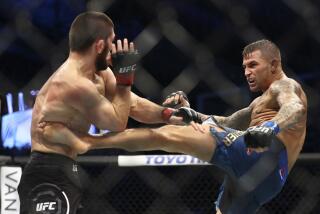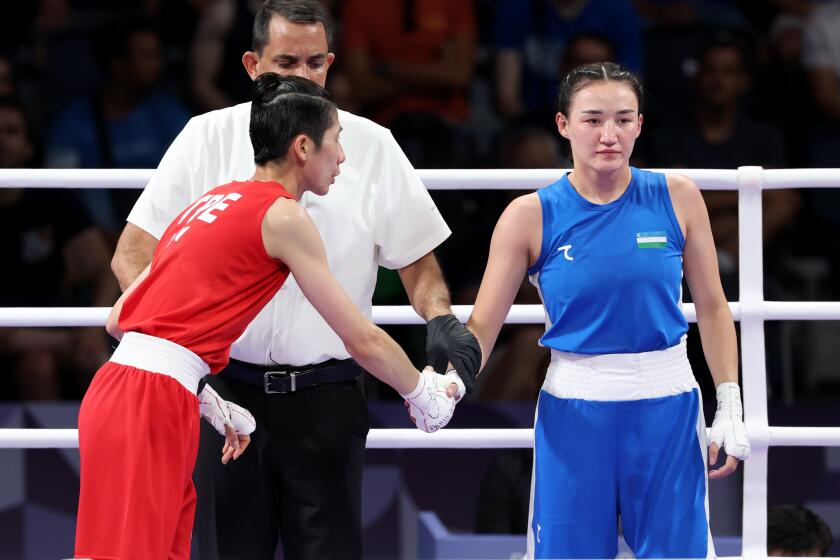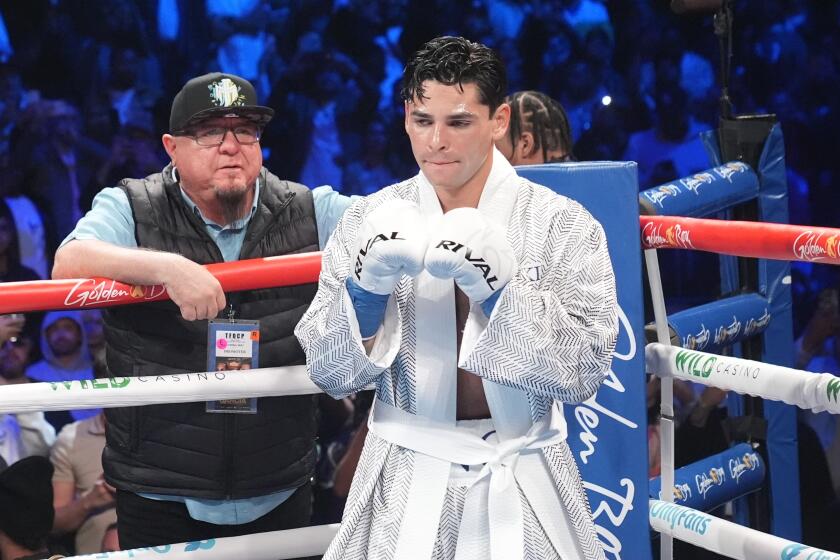Dan Henderson duels the UFC
Dan Henderson has been around mixed martial arts long enough to have a good idea of who gets paid what, and how various pay-per-view cards sell.
At the sport’s pinnacle event, Ultimate Fighting Championship 100 in Las Vegas last July, Temecula’s Henderson produced the knockout of the night. “They hit a home run with their numbers, and I had hit the grand slam in the event,” Henderson said.
His $100,000 knockout bonus was nice, and the $90,000 Land Rover he received for coaching on a reality show against his UFC 100 foe, brash-talking Brit Michael Bisping, was a lavish bump beyond the $650 weekly coaching stipend he said he was paid while guiding the team of young fighters on the popular reality cable-television series “The Ultimate Fighter.”
Yet, there was a strong feeling gnawing at Henderson that he’d been shorted. UFC 100 generated about 1 million to 1.5 million pay-per-view buys, and Henderson knew he had been slotted to receive a substantial cut of that revenue before a heavyweight title fight was shifted onto the card, relegating Henderson-Bisping short of a co-main event.
“That probably cost me $1 million,” Henderson, 39, said.
It didn’t help that a spark plug misfired in his new Land Rover, leaving him briefly stranded on the drive home from Las Vegas.
With his UFC contract expiring after the July event, Henderson said being deprived of any extra pay-per-view money forced him to act.
So the UFC’s two-time title fighter joined rival Strikeforce, which has placed him in the main event of its second CBS-televised card in Nashville on Saturday , giving Henderson an immediate middleweight title shot against champion Jake Shields.
“If enough guys start jumping ship, it will put pressure … to let the fighters share in more of the revenue,” Henderson said.
He has a four-fight deal with Strikeforce that could close his fighting career. He operates a gym in Riverside County, owns an apparel company and generates additional income by allowing his likeness to be used in a coming EA Sports video game and making personal appearances.
“We’re giving guys the freedom to go exploit their name and likeness rights,” Strikeforce CEO Scott Coker said. “We’re in the fight business. We make our money with events and television rights. These fighters have paid dues, they work to get sponsorship deals. As long as there’s no conflict with our title sponsor … we think we give them more freedom.”
Henderson said those dues are a significant part of why he left UFC at the height of his popularity.
Henderson once simultaneously held two titles in the now-defunct mixed martial arts organization PRIDE, and when UFC purchased the company, he was given two title shots: losing a unanimous decision to then-light-heavyweight champion Quinton “Rampage” Jackson in 2007, and getting submitted by still-reigning middleweight champion Anderson Silva in 2008.
A rematch with Silva was on the negotiating table as part of Henderson’s re-signing with UFC, he said, and so was a special deal to allow him a cut of first- and second-year profits from the UFC’s popular video game that featured his likeness.
“I never saw a dime,” Henderson says of the video game money. “Where do you think the money should go? The fighters are asked to sign away their likeness rights, and [the UFC] tries to get it forever.”
UFC President Dana White said he had “no interest” in responding to Henderson’s comments.
Another UFC business stance that irked Henderson was the company’s interest in charging apparel sponsors, like Henderson’s own Clinch Gear, a fee, such as $10,000 for four months of unlimited appearances in the UFC octagon. “It’s like UFC is sticking their hands in our pockets,” Henderson said.
Countering Henderson’s complaints, UFC owners Lorenzo and Frank Fertitta have poured millions into building the UFC brand, and their fighters have in turn profited handsomely in a growing sport that was a bush-league, toughman contest a decade ago.
Henderson said he understands “it’s a business,” but noted that White “said he’d write me a check for $25,000” for public appearances connected to a future fight after UFC 100, “and I never saw that either. It’s made me think I need everything in writing from now on.”
Lorenzo Fertitta would not comment.
Meanwhile, White took a swipe at Henderson’s drawing power when he texted that he wouldn’t attend the Saturday Strikeforce card: “They have sold two tickets to that fight.”
Henderson said he’s excited about bringing MMA to new viewers on CBS, which has significantly boosted its age 18-34 male audiences with its occasional Saturday night fights.
“I don’t think Strikeforce is too far off,” Henderson said. “We need some more heavyweights and 205-pounders, but as contracts in the UFC begin to expire, guys are going to start looking in a different direction now because of me.”
More to Read
Go beyond the scoreboard
Get the latest on L.A.'s teams in the daily Sports Report newsletter.
You may occasionally receive promotional content from the Los Angeles Times.











